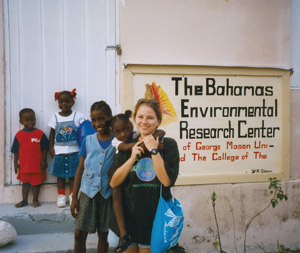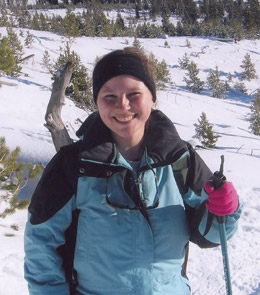Natural Selection
Kristy Jones’s love of nature makes her an obvious choice to educate others about the environment
By Ryann Doyle

Kristy Jones on Andros Island
Kristy Jones, BA Anthropology ’96 and MA Environmental Studies ’00, is working to protect the environment through education. As a manager in the National Wildlife Federation (NWF) Campus Ecology Program, she is helping college campuses—and college students—throughout the United States and Canada go green.
While researching job opportunities in nonprofit conservation, Jones chose the NWF mainly because of its large education component. The federation reaches out to communities to educate them on different ways they can protect wildlife and habitat and connect with nature.
“The NWF tries to get the word out and get people excited about conservation,” says Jones. “That was very attractive to me.”
Through the Campus Ecology Program, Jones also hopes to get the word out that global warming is a threat and encourage campus communities to find out more about what can be done individually or collectively. The program’s main focus is to engage 1,000 campuses to reduce carbon emissions by 2 percent each year, with a total reduction of 30 percent by 2020. Its second goal is to engage one million students, faculty, and staff in general global warming awareness through events and publications. Since the program was launched in 1989, it has made connections with about half of the United States’ 4,100 campuses.
 Whether an institution is beginning the program and wants to start recycling or is further along and wants to reduce emissions on campus through energy efficiency and greener transportation, the program supports a wide range of initiatives.
Whether an institution is beginning the program and wants to start recycling or is further along and wants to reduce emissions on campus through energy efficiency and greener transportation, the program supports a wide range of initiatives.
“Many schools are doing something on campus, but they want to do more and they don’t know where to find support,” says Jones. “A lot of the time, support comes from just connecting them with other schools in their region that have the same initiative to see how they surpassed some of the road blocks.”
Before joining the NWF, Jones worked for Mason’s Center for Field Studies, which focuses on international and national field studies, at the Bahamas Environmental Research Center on Andros Island. A collaboration between Mason and the College of the Bahamas, the center hosts environmental studies classes from different universities so students can experience life on a small island, learn how to interact with the community, and receive hands-on experience in conducting environmental research in their specific field of study, such as reef ecology, terrestrial ecology, botany, and geology.
“Andros is home to the third-largest barrier reef in the world, and because barrier reefs are endangered, the location was very attractive to reef ecology students. The students researched coral diseases, water temperature problems, overfishing, and other issues by engaging in a lot of hands-on learning,” says Jones.
Jones will continue to work to make campuses greener across the United States and Canada, as well as educate communities on ways they can be more environmentally cautious.
“Working for the National Wildlife Federation has been an incredible, meaningful experience, but even more so is having the opportunity to work with colleges and universities on initiatives that protect habitat and wildlife, conserve energy, and slow the global warming trend,” says Jones.

